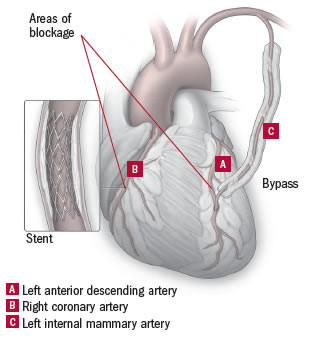
Respiratory health harms often follow flooding: Taking these steps can help

Tips to leverage neuroplasticity to maintain cognitive fitness as you age

Can white noise really help you sleep better?

Celiac disease: Exploring four myths

What is prostatitis and how is it treated?

What is Cushing syndrome?

Exercises to relieve joint pain

Think your child has ADHD? What your pediatrician can do

Foam roller: Could you benefit from this massage tool?

Stepping up activity if winter slowed you down
Medical Tests & Procedures Archive
Articles
Ask the doctor: New DNA-based test for colorectal cancer
Q. I heard that there is a new stool test for colon cancer screening. Can this test replace colonoscopy for me? I am 68 years old with no history of colon problems, and my last colonoscopy was normal.
A. Among screening tests for hidden colorectal cancer, colonoscopy remains the "gold standard" because it's the most effective technique for detecting colon cancers and simultaneously provides an opportunity to remove any precancerous growths (polyps). The new DNA-based stool test (Cologuard) is less invasive and inconvenient than colonoscopy and finds more cancers and polyps than older stool tests, but it does not entirely eliminate the need for colonoscopies.
Can't wait to see the doctor? You have choices
Emergency rooms, urgent care clinics, and retail clinics offer immediate care. Your symptoms determine which to use.
You've probably had an illness or injury that you weren't quite sure how to handle. Maybe it was a rattling cough, a finger slammed in a car door, or a rash crawling up your arm. If you can't get in to see your doctor, you have a few options for immediate treatment—the clinic at the nearby shopping mall, an urgent care center, or the emergency room at the nearest hospital. How do you decide which one to go to?
What's involved in memory screening and testing?
Checking for underlying conditions is the first step when investigating a change in thinking skills. Image: Thinkstock |
A mini mental status exam or a thorough cognitive assessment can give you answers and may improve your qualify of life.
There is something you can do about Alzheimer's disease-join a study
Thousands of volunteers are needed for current Alzheimer's studies. |
Women are at greater risk for dementia. Joining clinical trials can help to speed the development of promising drugs.
Abdominal aortic aneurysm: When you need this one-time test
Family history or past smoking both point to higher risk for this potentially fatal condition.
How many "lifesaving" medical tests have you been offered lately? One frequently marketed to older men is an ultrasound of the abdominal aorta, the large artery below the heart that feeds the lower body. A bulging weak spot there—an abdominal aortic aneurysm (AAA)—could eventually rupture, and that is usually fatal.
What you should know about anesthesia
Many procedures require anesthesia, and which of the four types you have can affect your recovery.
If you've ever had a tooth filled without Novocaine, you know the difference anesthesia can make. Anesthesia—whether it numbs your mouth or puts you into a full sleep—is designed to keep you comfortable during a procedure that otherwise might be hard to tolerate physically, emotionally, or both. "We have four goals: to see that you have no pain, that you're drowsy or unconscious, that your body is still so that the surgeon can work on it, and that you aren't left with bad memories of the procedure," says Dr. Kristin Schreiber, an anesthesiologist at Harvard-affiliated Brigham and Women's Hospital.
There are four basic kinds of anesthesia—local, which is typically administered to numb a small area; regional, which numbs a larger area, like your hand, arm, or foot; neuraxial (spinal or epidural), which is injected near the spine and numbs the lower half of your body; and general, which works in the brain to render you completely unconscious and unable to sense pain. The type used depends upon the procedure you're having, your state of health, and, often, your preferences.
Bypass plus angioplasty: The best of both worlds?
In hybrid heart surgery, the blocked or narrowed left anterior descending artery is bypassed with the nearby left mammary artery, while another blocked artery (in this case, the right coronary artery) is opened with angioplasty plus a stent. Illustration by Scott Leighton |
Known as hybrid coronary revascularization, this technique may become more widely available in the future.
Ask the doctor: Do I need a tuberculosis test?
Q. Why is my doctor checking me for tuberculosis? I thought that was eradicated long ago
A. It would be wonderful if tuberculosis (TB) had been eradicated long ago, but unfortunately that's not the case. It is true that the annual number of new cases in the United States has been dropping over the past 20 years; in 2013, there were about 9,500 new cases. However, around the world, particularly in developing nations, TB remains a huge problem. In 2013, there were nine million new cases of TB, and 1.5 million deaths from TB, in the world.
Personalized medicine sounds futuristic, but it's really about your relationship with your doctor
By Anne Fabiny, M.D., Editor in Chief
President Barack Obama recently announced the Precision Medicine Initiative, a new program to speed up discoveries based on information and technology stemming from the Human Genome Project. "Precision medicine" and "personalized medicine" are terms that describe health care tailored to an individual patient's genetic makeup, using information about a patient's genome to diagnose illness and design therapies to treat and cure disease. This approach has been described as "the medicine of the future."
However, it may be reassuring to know that although your doctor doesn't have your genome at hand, he or she is likely to be giving you personalized care as we understand it today.
Ask the doctor: Did I have a heart attack?
Q. The other night I woke up at about 2 a.m., and my heart was pumping hard and my lower jaw ached. It lasted about an hour, even though I took aspirin. Then I fell asleep. In the morning everything was fine. Was that a heart attack?
A. If you were my patient and you called my office and told me this, I would tell you to come right in and let me check you out. Probably it was not a heart attack, but the chance that it might have been is high enough that you need to be examined and tested. I hope that's what you did. If you didn't then, you should check with your doctor now.

Respiratory health harms often follow flooding: Taking these steps can help

Tips to leverage neuroplasticity to maintain cognitive fitness as you age

Can white noise really help you sleep better?

Celiac disease: Exploring four myths

What is prostatitis and how is it treated?

What is Cushing syndrome?

Exercises to relieve joint pain

Think your child has ADHD? What your pediatrician can do

Foam roller: Could you benefit from this massage tool?

Stepping up activity if winter slowed you down
Free Healthbeat Signup
Get the latest in health news delivered to your inbox!
Sign Up











